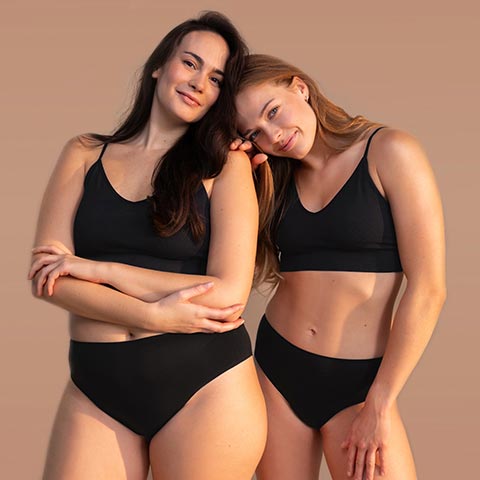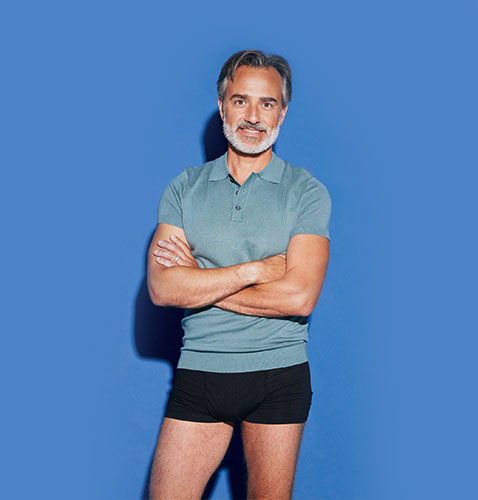Self Care for you and the planet
In Europe alone, 25 million tonnes of plastic waste are produced every year. This includes 49 billion tampons, pads and panty liners.1 Disposable hygiene products, such as tampons and pads, are among the top 10 products worldwide that end up in the ocean after disposal.2 Most products are made of plastics and are not biodegradable. Seabirds, fish and marine life mistake this waste for food and die horribly.
Did you know that



Can a single person make any difference at all?
In Germany, Austria and Switzerland, about 75,000 - 125,000 tonnes of menstrual hygiene products end up in the rubbish every year. Per menstruating person, that's 16,800 period products for a 40-year period.3
Calculated over a year, that's about 5 kilograms. That's about the weight of a full shopping bag. Year after year. A great way to avoid waste is to switch to reusable products. With a pair of washable period briefs or a menstrual cup you can avoid up to 4,000 disposable hygiene products.
Sustainability is not just a trend, it is a necessity. Unfortunately, just like periods, this lifestyle is also still a bit of a luxury. This is where we come in.
As a sustainable company, we at SELENACARE try to act as environmentally friendly as possible and develop the right products for everyday life in harmony with nature. From recycling in the office to product development. Zero Waste period products that are durable due to their high quality and at the same time affordable for as many people as possible.
What makes a product sustainable?
How environmentally friendly a product is does not only depend on the production location.
Ultimately, it all depends on the materials used, the emissions caused, the working conditions and the care of the period product. We have spent many hours, days and nights researching and thinking about how we can combine affordability with fair production and high quality with low environmental impact.
Made in Europe sounds very attractive at first glance because of the short transport routes. Unfortunately, that alone does not necessarily make the products more sustainable. 90 percent of the textiles bought in Germany come from Asia. More than half of them come from China.4 Thus, the raw materials for textile products are often imported from Asia, sewn together in Europe and sold with a "Made in Europe" label. Working conditions in European factories are also not always as fair as one might imagine. There are many people who work in unfair conditions and have to get by without ventilation or heating. Unpaid overtime and starvation wages despite the legal minimum wage are often not enough to live on.
In order to really be able to guarantee whether a supply chain is built sustainably, you need trustworthy and certified production and sourcing partners with the necessary know-how. You can read about how we produce here.
As our products are available in drugstores, pharmacies, supermarkets and specialist markets on the shelves as well as online throughout Europe, we benefit from large order volumes. That is why we are currently deliberately sourcing more of our products from our sourcing partners in China. We are in personal contact with the production sites and visit them regularly. Of course, we make sure that our production partners are BSCI certified. This way we can be sure that fair and safe working conditions prevail
Because there is no one golden solution in textile production, we also offer products in our shop that are produced in Europe. We communicate this transparently. In this way, we make it possible for those who have to keep an eye on the price as well as for all those who are particularly concerned about the environment to have a sustainable and safe zero waste hygiene product that saves money and waste in the long run

Reduce - Reuse - Recycle
Reduce disposable waste: check.
Use reusable products: check.
Recycling: also check!
If SELENACARE & SOUVERÄN products have reached the end of their life, you don't have to throw them away. Period underpants can still be worn as everyday underwear. Washable sanitary pads and panty liners can be sewn over like other fabric remnants and, for example: given a second life as cleaning rags. We know from our community that old menstrual cups can be used creatively, even in things like gardening!
1https://www.umweltberatung.at/warum-plastik-vermeiden
2https://info.bml.gv.at/themen/wasser/wasser-oeffentlich/periodsforfuture.html
3https://erdbeerwoche.com/meine-umwelt/muellproblem/
4https://de.statista.com/statistik/daten/studie/1859/umfrage/deutschlands-textilimporte-nach-herkunftslaendern/













